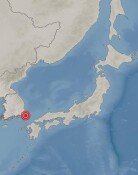Escalated tension in Northeast Asia
Escalated tension in Northeast Asia
Posted July. 08, 2017 07:11,
Updated July. 08, 2017 07:24
South Korean President Moon Jae-in and Japanese Prime Minister Shinzo Abe had their first summit in Hamburg, Germany on Friday (local time). Contrary to expectations, it has been reported that two leaders did not discuss agreement on sex slaves and other historical issues during their meeting. During a trilateral meeting among Moon, Abe and U.S. President Donald Trump on Thursday, Moon and Abe praised cooperation among South Korea, Japan and the U.S., saying, “We should meet often and have more opportunity to talk.”
As Moon has decided to use a two-track approach regarding historical and diplomatic issues, he was able to avoid conflicts while talking with Abe. Whether right or wrong, it seems unrealistic for Moon to try to resolve the issues between two countries unilaterally in short time. Japan should not have an indulgence to sex slaves. However, intimate military cooperation between South Korea and Japan is required and two leaders must work together to pressure North Korea if they want to detect signs of North Korea’s provocations.
Moon also made a significant decision with Trump and Abe on Thursday as three leaders agreed on stronger sanction and pressure on North Korea after its launch of an intercontinental ballistic missile. Three leaders have agreed to consider the United Nations Security Council sanction and to apply a maximum pressure on North Korea. Against a backdrop of increasing nuclear threats from North Korea, normalization of relations between South Korea and Japan will, in turn, benefit South Korea, Japan and the U.S.
Three leaders have also unanimously called for China’s tougher action on North Korea. Trump said he would consider additional financial sanctions on Chinese corporations and individuals engaging in illegal transactions with North Korea, showing his determination to pressure China on multiple fronts including politics, diplomacy and economy.
North Korea’s nuclear threats have eventually led to the rivalry between South Korea, Japan and the U.S. and North Korea, China, and Russia in Northeast Asia. The standoff among nations following North Korea’s missile launch has become more obvious after the G20 summit. The U.S. proposed a draft of a press statement strongly condemning North Korea during the U.N. Security Council’s meeting on Wednesday, but Russia stepped in and nullified the U.S.’s proposal while asserting that it was only a mid-range missile, not ICBM.
Though South Korea is teamed up with Japan and the U.S. against North Korea, China and Russia, South Korea cannot guarantee a friendly relationship with Japan. Meanwhile, given China’s direct involvement in South Korea’s national interests, South Korea cannot take issue with China on North Korea and economic cooperation. Against the backdrop, Moon has presented his Berlin vision to pursue denuclearization of the Korean Peninsula that guarantees security of the North Korean regime, pledging his commitment to take a leading role in solving inter-Korean issues. In order to untangle the twisted diplomatic relations in Northeast Asia, Moon should use the alliance between South Korea and the U.S. as a linchpin, prioritize normalization of relations with China, Japan and North Korea and then develop his roadmap.







